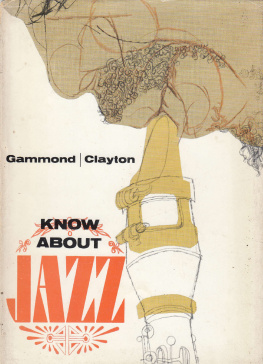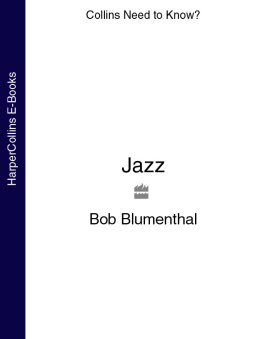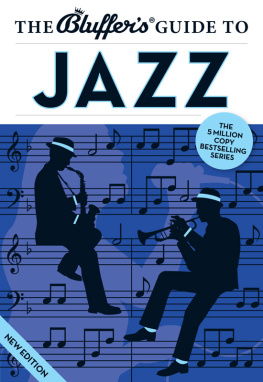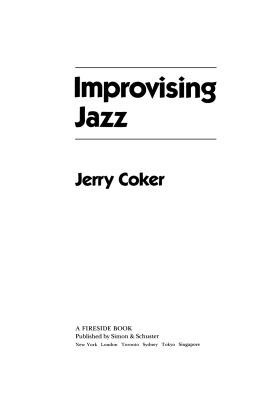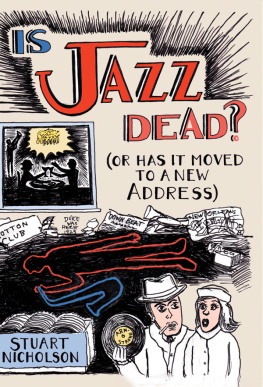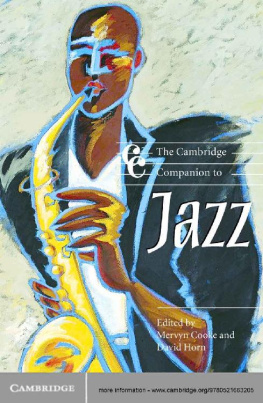JAZZ AND DEATH
JAZZ
AND
DEATH
MEDICAL PROFILES OF JAZZ GREATS
Frederick J. Spencer, M.D.

American Made Music Series
Advisory Board
David Evans, General Editor
Barry Jean Ancelet
Edward A. Berlin
Joyce J. Bolden
Rob Bowman
Susan C. Cook
Curtis Ellison
William Ferris
Michael Harris
John Edward Hasse
Kip Lornell
Frank McArthur
W. K. McNeil
Bill Malone
Eddie S. Meadows
Manuel H. Pea
David Sanjek
Wayne D. Shirley
Robert Walser
Charles Wolfe
www.upress.state.ms.us
Copyright 2002 by University Press of Mississippi
All rights reserved
Manufactured in the United States of America
10 09 08 07 06 05 04 03 02 4 3 2 1

Library of Congress Cataloging-in-Publication Data
Spencer, Frederick J.
Jazz and death : medical profiles of jazz greats / by Frederick J. Spencer.
p. cm.(American made music series)
Includes bibliographical references and index.
ISBN 1-57806-453-8 (cloth : alk. paper)
1. Jazz musiciansDeath. 2. Jazz musiciansHealth and hygiene. I. Title. II. Series.
ML385 .S63 2002
781.650922dc21
[B] 2001056864
British Library Cataloging-in-Publication Data available
For Norma, Gillian, and Anthony
with love and gratitude
CONTENTS
PREFACE
The first sentence in John OSheas Music and Medicine reads, The great composers of the eighteenth and nineteenth centuries are surrounded with legend and mythology. This implies that Bennie Moten died in Denver after an emergency operation for an acute illness. His death occurred in Kansas City during or after elective surgery for chronic tonsillitis. Immediate surgery on the tonsils is confined to the incision and drainage of a quinsy, or peritonsillar abscess, a shorter, simpler operation than removing them.
My aim in this book is fivefold: first, to promote accuracy in jazz historiography by correcting some of the myths and errors perpetuated by past writers; second, to demonstrate the variation in accounts of the same event by different reporters; third, to explore the medical histories of selected major jazz musicians and, where applicable, to show how illness affected their lives; fourth, to discuss the prevalence of substance abuse in the world of jazz, especially in the second half of the twentieth century; and fifth, to encourage the further study of these neglected facets of jazz history.
Mistakes now receive even wider distribution on the Internet. Apart from the indelicacy of describing him as Crippled Chick Webb, a hunchback dwarf, Webb did not die from Tuberculosis of the Spine. Technical pneumonia?! In the Encyclopedia Britannica!
In discussing medical histories, I have confined my remarks mostly to somatic illness. Scott Joplin died of syphilis, and Charlie Christian of tuberculosis, bacterial infections that have a well-documented course and treatment. Bix Beiderbecke and Bunny Berigan died indirectly from alcoholic excesses. A whole book, or books, could be written on what led to their addictions, without reaching a consensus. Apart from discussing a few cases of florid mental illness, I have made no attempt to analyze the psychosocial-economic-cultural factors that some say have determined the course of jazz and the habits of its players. There is no satisfactory explanation of human behavior. Theories far exceed facts. I have dealt sparsely with treatment, which was limited for early jazzmen and often ignored by them and later musicians. Health insurance coverage was also lacking, a shortcoming still true for some 40 million Americans. I have practiced medicine in Britain, Canada, and America. Despite some drawbacks, the British and Canadian national systems guarantee health care for everyone.
Clinical details of illness have been simplified, and most variations excluded. To have discussed each disease in detail would have filled a book many times this size. For instance, I have limited the description of syphilis to the most common manifestations of this protean disease. Biological phenomena, in sickness or health, rarely demonstrate a 100 percent occurrence. The course of illness and its treatment are based on probability, not certainty. Variability is the rule rather than the exception. Responses to pathological stimuli are determined by individual host factors and differ as much as any genetically determined attribute, such as height or weight. Tetanus (lockjaw) toxoid is a safe, effective immunization, but I investigated a death from tetanus in someone who had received a full course of toxoid. My assumption was that the host response to the stimulus of the toxoid was absent, one chance in millions. The varied side effects of drugs in different people account for the annual increase in size of the Physicians Desk Reference, known in the profession as Dr. P. D. R.
For much of my medical information, I have used textbooks of the 1960s and 1970s, as they describe the practice of medicine during the lifetime of many of the musicians discussed. Diagnosis and therapy have improved considerably since then. Where appropriate, I have sought out earlier sources to determine clinical data and therapy, as in the case of tuberculosis before Selman Waksmans 1944 discovery of streptomycin. No one person today knows the whole of medicine, and I have used consultants freely.
His death was caused by hepatic (liver) failure, perhaps a result of substance abuse. He did have a knee infection, but this did not kill him. De mortuis nil nisi bonum (Say nothing but good of the dead) is a contrived component of many obituaries.
It has become an accepted fact that Jazz musicians tend to be more liable than other professions to die early deaths from drink, drugs, women or overwork. Alcoholics were common in, and before, the Swing Era, but health and careers were seldom seriously compromised. After World War II, many bebop pioneers became prey to heroin addiction, which was often a dominant, unifying factor in illness and imprisonment. I have discussed drug addiction further in an epilogue. Apart from the possibility of transmitting venereal disease, women, married or not, have played a significant part in the lives of jazzmen, for good and evil. The environment where jazz was played, not overwork itself, was the real threat to health.
I am not a professional in either the performance or criticism of jazz, although I play drums well enough to perform the odd gig. Most of my publications have been in medicine, but I have read widely in, and occasionally It was beyond my temporal and financial limits to conduct a detailed medical-biographical investigation of each artist, and I have provided only thumbnail biographies. I have excluded blues performers. My main sources of information were my own extensive collection of jazz literature, local libraries, interlibrary loans, the Internet, and the wonderful, open holdings of the Institute of Jazz Studies at Rutgers University. These were supplemented by appropriate mail, e-mail, telephone conversations, and the Internet (some web sites may have changed by the time of publication). The illustrations were mostly selected to complement the medical text, not to serve as a meaningless portrait gallery of musicians.
Benny Green wrote, It would be too much to hope that the incidental circumstances of Bixs death would be clearly defined for posterity. I have tried to meet this wish for Beiderbecke and some other well-known jazz musicians. Information from patients hospital or office records is universally restricted; retrospective diagnoses therefore tend to be educated guesses. They invite criticism, and I lay no claim to infallibility. Nor do I cite in malice what I believe to be errors. Within the limitations imposed by medical and legal protocol and ethics, I hope that I have reached some conclusions that will be of interest, and use, to jazz fans and historians.
Next page







